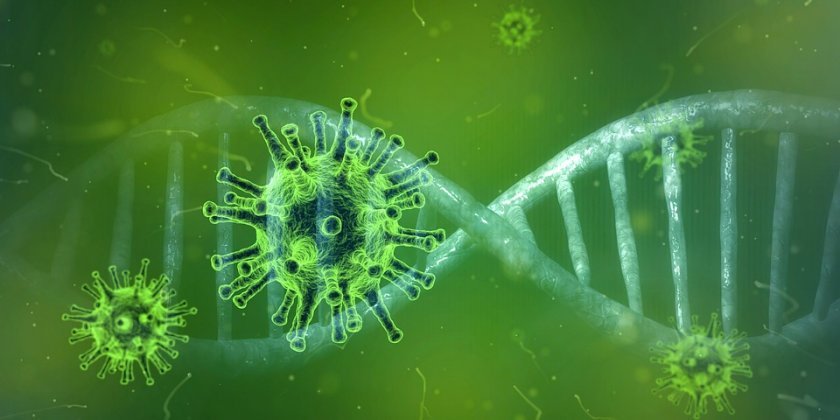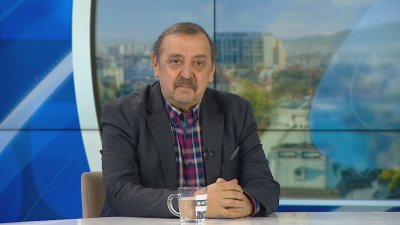A team of scientists from the University of Pittsburgh, led by a Bulgarian, have isolated a strong and effective antibody specific for COVID-19. The results of all tests were announced by "Cell" - one of the most renowned scientific journals, which publishes only objective and relevant to science data. Prof. Dimiter Dimitrov is at the heart of the discovery.
"Cell" does not give a platform to everyone. It publishes only significant and very well-proven findings.
Prof. Dimitrov's team is among the most respectable scientific teams in the world. At least, because there are already several effective antibodies developed by them, with which viruses like Hendra and Napa are not as scary and deadly as Ebola. They have done their job against the first two dangerous coronaviruses. And it could be expected that they would try to outsmart COVID-19 as well.
Prof. Dimiter Dimitrov - Center for Therapeutic Antibodies, University of Pittsburgh: It was ready in a week. The viral sequence of the nucleotides was published in late January, we immediately synthesized the viral particle, and in late February we had the antibody. And we even had a patent. It was quick, quicker than everyone else. The other big companies discovered their antibodies in March. But we are a small group and it takes us a long time to characterize the antibody.
The development of specific antibodies for the treatment of viral infections is not a very popular concept. And it is not one of those discussed as a way out of the COVID crisis. But the Pittsburgh team is about to change the agenda.
Assoc. Prof. Andrey Chorbanov - Laboratory of Experimental Immunology, Bulgaroian Academy of Sciences (BAS): It is known that antibodies are entirely positive when it comes to bacterial toxins, infections of this nature. But with viruses, the issue is very individual for each virus. And we just don't know about this one. We have viruses in which the antibodies are 100% positive in terms of neutralization. There are also those in which the antibodies do not help at all. I'll give a typical example - the AIDS virus, in which antibodies are just a sign that the person has been infected with HIV and nothing more. So from this aspect, the antibodies have a still unclear perspective.
But the perspective for Prof. Dimitrov has long been clear. He has extensive experience, especially with viruses, and has many successful developments in his portfolio.
Prof. Dimiter Dimitrov - Center for Therapeutic Antibodies, University of Pittsburgh: 20 years ago we were the first to isolate antibodies against Sars, then against Mers, which came from Saudi Arabia from camels, the camel virus and then against some viruses in Australia and India - Hendra and Nipah.
Antibodies against the deadly Hendra and Nipah have even been approved for production and are used to treat people in Australia. So the scientist has a clean and accurate approach and reacts quickly with COVID. From the large and complex antibody molecule, it selects only that small region that binds specifically to the virus itself. And so it blocks the virus's connection with those receptors on the cell that put it inside. A very clever approach that predetermines all the advantages of their small molecule, which they call Ab8.
Prof. Dimiter Dimitrov - Center for Therapeutic Antibodies, University of Pittsburgh: Smaller in size, which means two things. First, it binds to the virus better because it is smaller and can simply adapt better, and second, it penetrates human tissues. It penetrates better everywhere. And as we know, this virus not only infects the lungs, it also infects other tissues. So, because it penetrates better, it can be more effective throughout the body.
Although quickly synthesized, Ab8 has a long way to go to prove effective. For this purpose, the team is looking for suitable models. Mice with human receptors have been developed so that they can be infected with COVID. But the work really started when they managed to modify the virus so that it could infect any mouse. This gives the team a chance to prove the effectiveness of Ab8 faster.
Prof. Dimiter Dimitrov - Center for Therapeutic Antibodies, University of Pittsburgh: The moment we made the other model, we could immediately use many more mice and then see what is the minimum dose that can be protective. And as a result, we showed with this model that even with a very small antibody, meaning 50 micrograms per mouse, it corresponds to 100 milligrams per person.
In comparison, some of the large pharmaceutical companies, according to their latest published data, have achieved a significant protective effect, but with 7 grams of the selected antibodies. At this stage, Ab8 has also gone through tests for safety - or no side effects.
Prof. Dimiter Dimitrov - Center for Therapeutic Antibodies, University of Pittsburgh: We also specifically tested it for how safe it can be, showing that it does not bind to absolutely all human proteins we tested - for example 6,000 proteins, and only to this protein.
Assoc. Prof. Andrey Chorbanov - Laboratory of Experimental Immunology, BAS: The risk is very small because those antibodies that have been developed are quite small. The antibodies themselves, when they are monoclonal, when they are for specific therapy, the risk is very small. Of course, there are purely technological obstacles that I assume the authors of these innovations will solve. The small particles, which are a small, specifically made antibody, also have a small presence in the body. The small molecules do not have a long half-life. But this is a problem they will find a solution to.
Prof. Dimiter Dimitrov - Center for Therapeutic Antibodies, University of Pittsburgh: Besides, the important thing I wanted to say is that this antibody is very, very stable. In fact, special tests that others generally don't do are at least not published, and that's new. For example, it stays for three months at a human temperature of 37 degrees, then we take it and no change in efficiency.
According to scientists, the activity of Ab8 can be increased to 6 months, which is quite commensurate with the time of protection that the currently developed vaccines would give. Or it could, in addition to treatment, be used as a passive vaccine to protect the most vulnerable groups to the virus. Where even the best vaccine can't help.
Assoc. Prof. Andrei Chorbanov - Laboratory of Experimental Immunology, BAS: It is clear that even if we have a wonderful vaccine against anything, it never covers 100% of the population due to a number of factors, especially some genetic preconditions, some diseases, which make it impossible to use the vaccine or inability to obtain positive therapy. So, the antibodies in this case would act as, let’s say, a duplicate therapy to cover such gaps, of course, provided that they are successful and developed as a therapy. However, they can act very quickly and treat an already ill person.
The small size of Ab8 predetermines another advantage. Because it enters very precisely into the active centre with which the virus binds to the receptors of the cell, no mutations in it can change its action.
Prof. Dimiter Dimitrov - Center for Therapeutic Antibodies, University of Pittsburgh: Yes. This is the other feature, what we showed in our article - we also tested it against all mutants of the virus that have been isolated so far in humans. And it works against all.
Assoc. Prof. Andrey Chorbanov - Laboratory of Experimental Immunology, BAS: Each specific therapy is very positive and I think that this is the way to develop - to look for a specific vaccine and specific therapy, not to try thousands of substances with general action. Just remember since February how much and what is the list of substances and agents and old drugs that have been used for any purpose for a short period, after which nothing at all about them.
Ab8 is about to prove its effectiveness in humans. But for this purpose, the team needs to obtain permission to produce it. Probably another obstacle may come out - the price.
The production of monoclonal antibodies is a rather complex, expensive and slow process. But a few more therapeutic antibodies are likely to hit the market, which are sure to cut prices.
And the team from Pittsburgh noted another achievement - they completed their development in 8 months, the last time they needed 2 years. But they are determined to cope with this term as well. From now on, they are preparing for the next pandemic.
Prof. Dimiter Dimitrov - Center for Therapeutic Antibodies, University of Pittsburgh: What we do is very interesting There are viruses that we know are in animals and can jump to humans. We preventively develop antibodies against these viruses. At the moment we even have some.
The end of this race is visible, as well as the beginning of the next. But then we have to be faster and better.








 Чуй новините
Чуй новините Подкаст
Подкаст
























